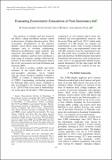Evaluating Econometric Evaluations of Post-Secondary Aid
Author(s)
Angrist, Joshua; Autor, David H; Hudson, Sally Lindquist; Pallais, Amanda Dawn
DownloadAngrist_Evaluating econometric.pdf (511.4Kb)
PUBLISHER_POLICY
Publisher Policy
Article is made available in accordance with the publisher's policy and may be subject to US copyright law. Please refer to the publisher's site for terms of use.
Terms of use
Metadata
Show full item recordAbstract
In an ongoing evaluation of post-secondary financial aid, we use random assignment to assess the causal effects of large privately-funded aid awards. Here, we compare the unbiased causal effect estimates from our RCT with two types of non-experimental econometric estimates. The first applies a selection-on-observables assumption in data from an earlier, nonrandomized cohort; the second uses a regression discontinuity design. Selection-on-observables methods generate estimates well below the experimental benchmark. Regression discontinuity estimates are similar to experimental estimates for students near the cutoff, but sensitive to controlling for the running variable, which is unusually coarse.
Date issued
2015-05Department
Massachusetts Institute of Technology. Department of EconomicsJournal
American Economic Review
Publisher
American Economic Association
Citation
Angrist, Josh, David Autor, Sally Hudson, and Amanda Pallais. “ Evaluating Econometric Evaluations of Post-Secondary Aid † .” American Economic Review 105, no. 5 (May 2015): 502–507. © 2015 American Economic Association
Version: Final published version
ISSN
0002-8282